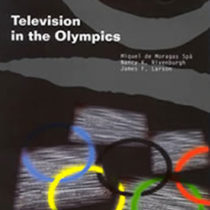
Television in the Olympics
Miquel de Moragas Spà; Nancy K. Rivenburgh; James F. Larson
1995
For decades, scholars have studied the Olympic Games – the history, the sports, the politics, the cultures, and the economics involved – in order to understand how each aspect of the event, relates to the modern Olympic movement as created by Baron Pierre de Coubertin nearly 100 years ago. Television in the Olympics expands this research, using a multidisciplinary approach, to explore the Olympics as a communications event. In particular, it investigates the role of television in shaping the Olympic Games well beyond a festival of international athletics into a global media event of unprecedented size and reach.
Television in the Olympics analyzes three broad aspects of television in the Olympic Games reflecting the three main parts of the book: Economic, Organizational and Technological Infraestructures for Olympic Television; The Communication of Culture, Politics, and Olympism in the Opening Ceremony (a comparative analysis of 28 broadcasts from around the world); and The Viewing Experience. All parts touch upon crucial issues related to media technology, television and the construction of meaning and the influence of local cultural contexts on perceptions of global phenomena.



